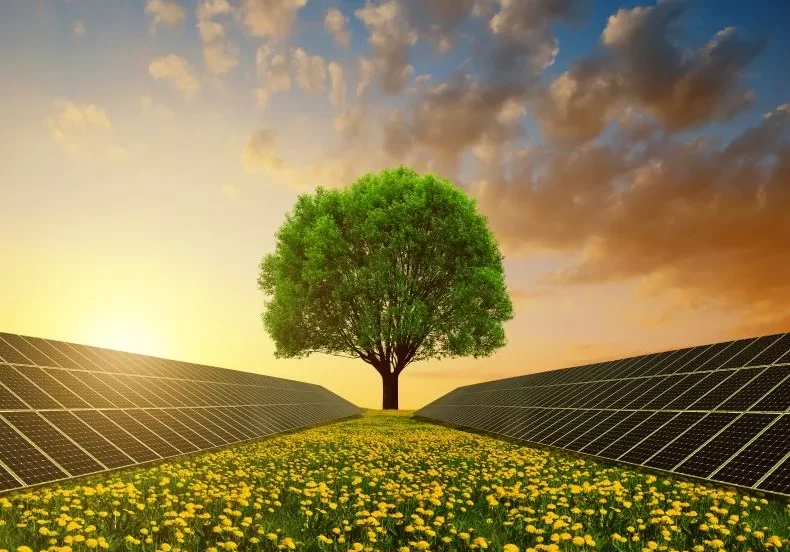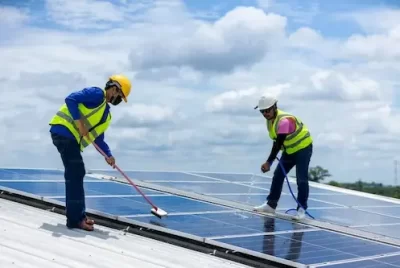Solar Energy 101: Understanding the Basics of Harnessing Sun Power
We may earn a commission for purchases made using our links. See our disclosure to learn more.
Solar energy, derived from the sun’s radiation, has emerged as a renewable energy source that offers a cleaner and more sustainable option compared to fossil fuels. In this article “Welcome to Solar Energy 101”, we delve into the fundamentals of solar energy, exploring how it works and the benefits it brings.
What is Solar Energy?
Solar energy is derived from the sun’s radiation, which is harnessed and converted into usable electricity or heat. It’s a renewable energy source that offers a cleaner and more sustainable option compared to fossil fuels. Solar power can be utilized for various purposes, including residential, commercial, and industrial applications.
How Does Solar Energy Work?
Solar energy systems primarily consist of solar panels, also known as photovoltaic (PV) panels, which convert sunlight into electricity. When sunlight hits the solar panels, the photovoltaic cells within them generate direct current (DC) electricity. This electricity is then converted into alternating current (AC) electricity using an inverter, making it suitable for powering homes and businesses.
Benefits of Solar Energy
Environmental Benefits
Solar energy produces no greenhouse gas emissions, reducing carbon footprints and mitigating climate change. It helps combat air and water pollution caused by traditional energy sources.
Cost Savings
By harnessing solar energy, you can significantly reduce your electricity bills, especially in the long run. Solar panels have a long lifespan, requiring minimal maintenance and offering a return on investment over time.
Energy Independence
Solar power grants individuals and businesses the ability to generate their own electricity, reducing reliance on the grid. This independence provides stability and security in times of power outages or fluctuations.
Types of Solar Energy Systems
1. Grid-Tied Systems: These systems are connected to the electrical grid, allowing excess solar energy to be fed back into the grid. Grid-tied systems enable you to earn credits or even profit through net metering.
2. Off-Grid Systems: Off-grid systems operate independently from the utility grid. They are ideal for remote locations or areas with unreliable grid access, providing a self-sufficient and sustainable energy solution.
Choosing the Right Solar System
When selecting a solar system, consider factors such as energy requirements, available space, and budget. Consult with reputable solar installers to assess your needs and determine the most suitable system size and configuration for your specific situation.
Installing Solar Panels
Solar panel installation should be carried out by trained professionals to ensure optimal performance and safety. Proper placement and orientation of panels are crucial for maximizing energy production. Seek assistance from experienced installers to ensure a seamless and efficient installation process.
Maximizing Solar Energy Efficiency
To maximize solar energy efficiency, implement the following strategies:
1. Regular Maintenance: Keep your solar panels clean and free from debris. Schedule periodic inspections to identify and address any potential issues promptly.
2. Energy Monitoring: Utilize energy monitoring systems to track your energy consumption and identify opportunities for further efficiency improvements.
Government Incentives and Rebates
Governments around the world recognize the importance of transitioning to renewable energy sources like solar power. Many offer incentives and rebates to encourage individuals and businesses to adopt solar energy. These incentives can include tax credits, grants, or subsidies that help offset the initial installation costs. Research local government programs and consult with solar experts to take advantage of these financial incentives.
Common Misconceptions about Solar Energy
Solar Energy is Expensive
While the upfront cost of installing a solar system may seem significant, it’s important to consider the long-term savings and return on investment. With the decreasing costs of solar panels and available incentives, solar energy has become more affordable and accessible.
Solar Energy is Inefficient:
Advances in solar technology have significantly improved the efficiency of solar panels. Modern solar systems can harness a greater amount of energy from sunlight, making them highly efficient and productive.
Solar Energy and the Environment
Solar energy plays a vital role in preserving our environment and reducing our ecological footprint. By utilizing solar power, we can:
1. Reduce Carbon Emissions: Solar energy produces no greenhouse gas emissions, helping to combat climate change and air pollution.
2. Conserve Water: Traditional energy sources like coal or natural gas require large amounts of water for cooling and processing. Solar power does not consume water, making it a sustainable alternative.
Maintenance and Longevity of Solar Panels
Solar panels are designed to be durable and require minimal maintenance. However, regular inspections and basic upkeep are essential to ensure optimal performance and longevity. Here are a few maintenance tips:
1. Keep Panels Clean: Regularly remove dirt, dust, or debris that may accumulate on the surface of the panels. This can be done with a soft brush or hose.
2. Check for Damage: Inspect panels for any signs of damage or wear. If you notice cracks or other issues, contact a professional for repair or replacement.
The Future of Solar Energy
The future of solar energy looks promising as advancements in technology continue to make it more efficient and affordable. Here are a few key developments to watch for:
1. Improved Energy Storage: Battery storage systems are becoming more advanced, allowing solar energy to be stored and used during non-sunny periods, increasing self-sufficiency and reliability.
2. Solar Integration in Infrastructure: Solar panels are being integrated into various infrastructure elements like buildings, roads, and even windows. This integration enables widespread solar adoption and maximizes energy production.
Conclusion
Solar energy is a sustainable, cost-effective, and environmentally friendly alternative to traditional energy sources. By understanding the basics of harnessing solar power in this “Solar Energy 101” article, you can make informed decisions about installing solar systems for your home or business. Embrace the benefits of solar energy, reduce your carbon footprint, and take control of your energy future.
FAQs (Frequently Asked Questions)
1. Are solar panels only suitable for sunny climates?
• Solar panels can generate electricity even in cloudy or overcast conditions. While sunlight is essential for optimal performance, solar energy systems can still produce electricity in less sunny regions.
2. How long do solar panels last?
• Solar panels have an average lifespan of 25 to 30 years. However, they can continue to produce electricity beyond that period, albeit at a slightly reduced efficiency.
3. Can I sell excess solar energy back to the grid?
• Yes, with grid-tied solar systems, you can feed excess energy back into the grid and receive credits or compensation through net metering programs.
4. What is the payback period for a solar system?
• The payback period varies depending on factors such as the initial cost, energy consumption, and available incentives. On average, solar systems pay for themselves within 5 to 10 years.
5. Are there any maintenance costs associated with solar panels?
• Solar panels require minimal maintenance and have low associated costs. Regular cleaning to remove dirt and debris, along with occasional inspections, are typically sufficient. In some cases, professional maintenance may be required, but the overall costs are minimal compared to the long-term savings and benefits of solar energy.
6. Can I install solar panels myself, or should I hire professionals?
• While DIY installation may seem like an option to save money, it is recommended to hire professionals for solar panel installation. Certified installers have the knowledge, experience, and tools necessary to ensure proper placement, wiring, and safety compliance. They can also provide guidance on system sizing, equipment selection, and maintenance.
7. What happens to solar energy production during power outages?
• In grid-tied systems without energy storage, solar energy production is automatically shut off during power outages to protect utility workers. However, by incorporating energy storage systems like batteries, you can have backup power during blackouts, allowing you to continue using solar-generated electricity.
8. Can I use solar energy to heat water in my home?
• Yes, solar thermal systems can be used to heat water for residential or commercial purposes. These systems utilize solar collectors to capture the sun’s heat and transfer it to a water storage tank. Solar water heating can significantly reduce reliance on traditional water heating methods and save energy costs.
9. What is the environmental impact of solar panel production?
• While solar panel production does have an environmental impact, it is considerably lower compared to the environmental damage caused by fossil fuel extraction and combustion. Manufacturers are increasingly adopting sustainable practices, using recycled materials, and improving energy efficiency in the production process to minimize the environmental footprint of solar panels.
10. Can I install solar panels on a rented property?
• In most cases, installing solar panels on a rented property requires the permission and cooperation of the property owner. However, you can explore options like community solar programs or portable solar solutions that do not require permanent installation and can be used in rented spaces.
Remember, embracing solar energy not only benefits you financially but also contributes to a cleaner and more sustainable future. Consult with solar energy professionals, research local incentives, and make an informed decision to harness the power of the sun.




